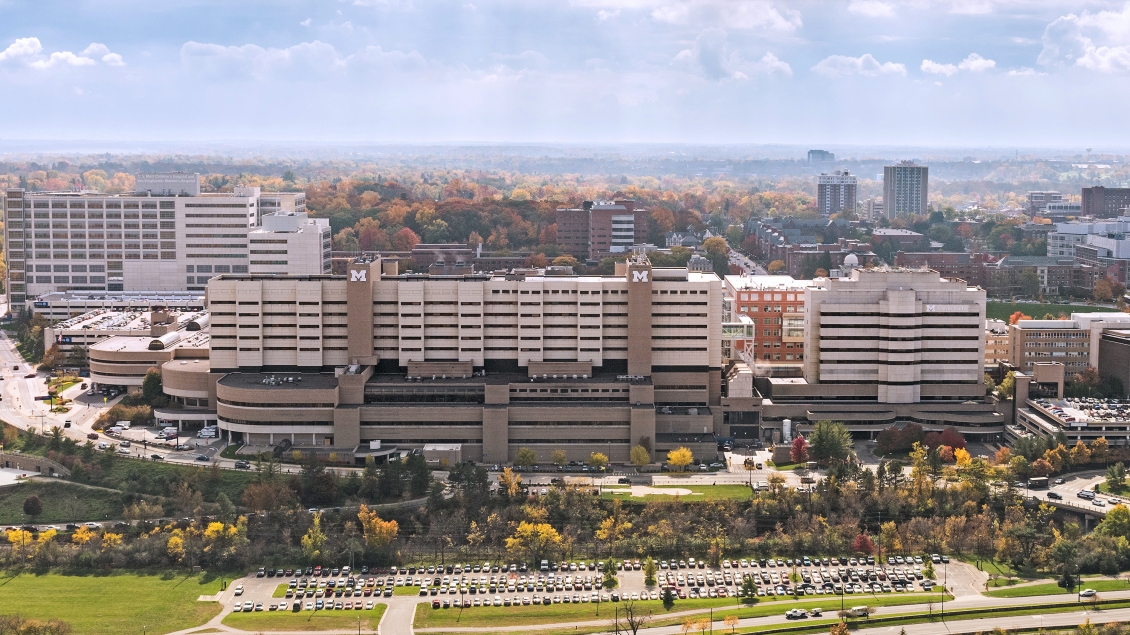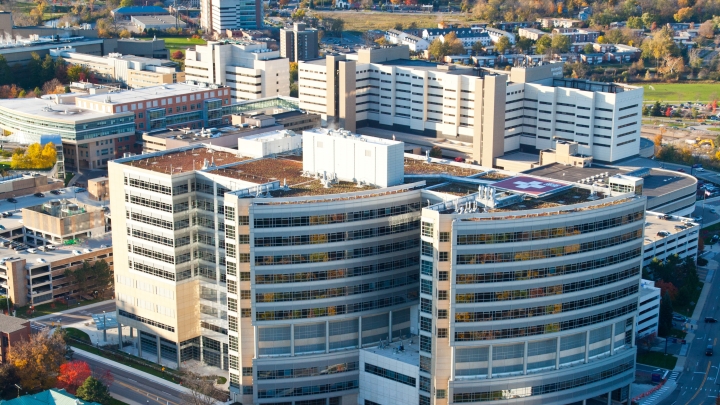
Discover our Infectious Diseases Fellowship Program—a dynamic blend of research and clinical training. With expert faculty and diverse experiences at U-M Medical School and the Ann Arbor VA Healthcare System, our program prepares future leaders in infectious diseases. Join us to unlock endless possibilities in this exciting field.
The Infectious Diseases Fellowship Program at the University of Michigan Medical School is one of the leading programs in the country dedicated to preparing physicians for excellence in the diagnosis and management of infectious diseases and to advancing the field through research and education. Our fellowship is a comprehensive program accredited by the Accreditation Council for Graduate Medical Education (ACGME).
Our fellowship offers a dynamic blend of clinical training, research opportunities, and educational experiences in a supportive and collegial environment. Our fellows graduate equipped to pursue a wide range of career paths including academic medicine, public health, epidemiology, and clinical practice. Unique features include our multidrug resistant organism (MDRO) service and a close relationship with our nearby School of Public Health allowing fellows to participate in the graduate level Summer Session in Epidemiology or pursue additional training in public health. For interested fellows, we offer formal tracks focused on medical education, transplant infectious disease, antimicrobial stewardship, and research.
Fellows gain extensive experience in managing diverse infectious diseases through rotations at our two training sites, the University Hospital and the VA Ann Arbor Healthcare System. Trainees encounter a myriad of infectious conditions, from community-acquired infections to complex nosocomial and opportunistic infections occurring in immunocompromised hosts. Our fellows participate in both inpatient consult services and outpatient clinics and provide follow-up care for patients they meet during their inpatient consult months.
Michigan Medicine has had a Ryan White funded HIV/AIDS Program since 1997, and currently we care for more than 900 HIV infected individuals. Additional HIV experience is available at the Ann Arbor VA Medical Center. With mentorship from our expert faculty, fellows learn to take a comprehensive approach to patient care, emphasizing evidence-based treatment and compassionate communication.
We feel that it is critical that all fellows, regardless of their eventual career interests, receive core experiences in the following areas: Infection Prevention and Hospital Epidemiology, Antimicrobial Stewardship, HIV/AIDS, and Transplant Infectious Disease. To that end, we have created curricula in each of those areas to achieve core competence. For fellows with particular interest in antimicrobial stewardship, medical education, transplant infectious disease, or intensive research training, specialized tracks are available.
Research is an integral part of our fellowship program. Fellows participate in lectures and small group discussions as part of the curriculum. Fellows also have the opportunity to pursue formal training in study design/biostatistics through the U-M School of Public Health. Fellows may engage in a broad array of research activities, including basic science investigations, clinical and translational research, qualitative research, epidemiologic studies, and health services research. We encourage fellows to collaborate across departments and institutes to enhance their research experience, as many of our current faculty already do. View this video to hear about research opportunities from the division’s director of research.
Our faculty members are recognized leaders in their fields and are committed to mentoring fellows throughout their research endeavors. Each fellow will design and implement a scholarly project, with the aims of presenting at national meetings and publishing in peer-reviewed journals.
Education is bolstered by a robust conference and lecture curriculum that includes didactic lectures, journal clubs, case conferences, and board review sessions. Our training program also emphasizes the importance of teaching, and fellows have opportunities to educate medical students and residents and participate in a “fellows as teachers” curriculum at the Ann Arbor VA.
Mentorship is a cornerstone of our program. In addition to their research mentor, each fellow is paired with a faculty mentor who provides guidance on career development, scholarly pursuits, and work-life balance. This relationship fosters professional growth and helps ensure the success of our fellows beyond their training at Michigan Medicine.
Department of Internal Medicine
University Hospital South
1500 East Medical Center Drive
Ann Arbor, MI 48109-5226
Applications for fellowships should be submitted online via the ERAS system. Applicants must receive an electronic token from ERAS prior to registration.
Applicants must have a minimum of J-1 visa status. Applicants with H-1B visas will not be considered.
ERAS opens for all fellowship applicants in early July and our program will receive applications in mid-July. Interviews will be held virtually from August through October and the fellows who match with us will begin fellowship on July 1 of the following year.
To learn more about our program, please view this PowerPoint presentation video or PDF with transcript by our Infectious Diseases Fellowship Program Director, Dr. Daniel Kaul.
Documents Required through ERAS
- Common Application Form
- Personal Goals Statement
- Medical School Transcript
- Dean's Letter/MSPE
- Letters of Recommendation (3)
- Three letters of reference which are no older than two years from the projected start date at the University of Michigan are required. Names, titles, and addresses of those who will provide reference letters must be included with the application. Letters must be on letterhead and sent to current Dean's office to be submitted online to ERAS.
- One letter must come from either the Training Program Director or Department Chair.
- Two letters must come from faculty from applicant's previous training program who are aware of the applicant's clinical activities.
- USMLE Transcripts
- ECFMG Status Report (if applicable)
- Wallet-Sized Color Photo (optional)
The University of Michigan offers highly competitive salaries and generous benefits to our fellows and advanced trainees. Trainee salary will be commensurate with that of a House Officer at an equivalent level of training based on the HOA contract.
We are committed to equipping each fellow with the necessary tools they need to excel as experts and leaders, and empowering them to advance patient care, research, and education in infectious disease medicine.
Over 100 Infectious Diseases specialists have completed their fellowship training in our program. Approximately half have entered academic medicine and have become respected faculty members, clinicians, teachers, or investigators.
Below are our recent graduates and where they went to the first year after their fellowship.
- Louis Saravolatz, MD - Assistant Professor, Michigan Medicine Division of Infectious Diseases
- Elizabeth Scruggs-Wodkowski, MD - Assistant Professor, Michigan Medicine Division of Infectious Diseases
- Laura Felley, MD, PhD - ID Attending, Gunderson Lutheran Medical Center
- Stephen Maurer, MD - Clinical Assistant Professor, University of Pittsburgh Department of Medicine
- Zoe Raglow, MD - Clinical Lecturer, Michigan Medicine Division of Infectious Diseases
- Nathaniel Soper, MD - Internal Medicine Physician, Trinity Health IHA Medical Group
- Noora Kazanji, DO - ID Private Practice, Corewell Health, Michigan; Oakland University MPH Program
- Adam Ressler, MD – UM SPH Preventive Medicine Residency Program
- Anastasia Wasylyshyn, MD – Assistant Professor, Michigan Medicine Division of Infectious Diseases
The Department of Internal Medicine (DOIM) Division of Infectious Diseases is committed to creating and cultivating a diverse and inclusive community that provides our faculty, learners, and staff with the opportunities and support they need to thrive. Visit the DOIM Office of Diversity, Equity, Inclusion, and Well-Being to learn more.

Program Director
Fellowship - Infectious Diseases

Expand your career trajectory in a high-volume academic medical center that also supports and excels in a wide range of basic science, translational and clinical research programs.

We find a new reason to love Ann Arbor nearly every day — year-round outdoor activities, cultural experiences, a growing food scene, and a welcoming, family-friendly atmosphere are just a few that come to mind. Explore all that Ann Arbor and our surrounding communities have to offer.